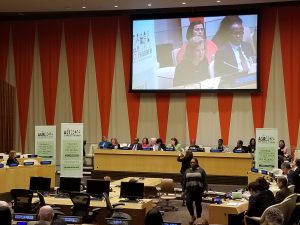New York, April 2, 2019
I’m honored to speak on behalf of civil society to support the launch of this important campaign. I represent the Watchlist on Children and Armed Conflict, a global network of human rights and humanitarian organizations committed to protect children in war. Our members document violations, provide aid and services for children most affected, and advocate for accountability and better protection.

I have been working on children and armed conflict for 20 years, which provides me with some perspective on how far we have come:
- 20 years ago, it was still legal under international law for children as young as 15 to be legally recruited and sent into war; today 168 governments have ratified standards prohibiting the use in hostilities of children under 18.
- 20 years ago, there were no formal agreements with governments or armed groups to end violations against children; today there are nearly 30.
- 20 years ago, it was virtually unheard of for a soldier or commander to face negative consequences for recruiting a child; today, the International Criminal Court, the Special Court for Sierra Leone, and national courts have convicted commanders and even a former head of state for child recruitment.
- 20 years ago, there was little awareness about the ways that schools come under attack, how military use of schools negatively impacts children, or how best to prevent or respond to the recruitment of child soldiers; today, we have scores of governments that have committed to concrete action through the Safe Schools Declaration, Paris Principles, and Vancouver Principles.
But we wouldn’t be here if we weren’t concerned about continuing and horrific violations against children. In too many countries, violations against children are on the rise. In far too many places, impunity is the rule. We also s
ee the troubling erosion of established norms. For example, in the context of counterterrorism, we increasingly see former child soldiers being prosecuted and imprisoned instead of receiving rehabilitation and reintegration.
Civil society is united with the SRSG [Special Representative of the Secretary-General for Children and Armed Conflict], Member States, and the UN in the conviction that the current situation is unacceptable. We must act to better protect children.
The SRSG has challenged us to act in key and impactful ways:
- We can act by increasing our advocacy and diplomacy to pressure parties to conflict to sign and implement action plans.
- We can act by withholding arms and military support for parties that continue violations against children.
- We can act by providing resources on the ground – to ensure that schools are rebuilt and kept open and that every child has access to the services they need.
- We can act by increasing our commitments, including endorsing the Safe Schools Declaration, the Vancouver Principles, and the Paris Principles.
- We can act by holding perpetrators accountable, including imposing sanctions when warranted and conducting criminal investigations against those responsible, to send a message that our global community will not tolerate these violations.
If we do these things, how might the world change for children? Children will be less likely to be exploited as soldiers and used as cannon fodder on the front lines of armed conflict. They will be safe in their homes and communities, and be able to attend school without fear. Children who have been affected by armed conflict will have support to re-enter school, get jobs, support themselves, and be active, vital members of their communities. Parties to armed conflict will know that if they fail to protect children, there will be consequences.
Civil society is committed to this vision, and looks forward to working with the SRSG and everyone here to make it a reality.
Thank you.



